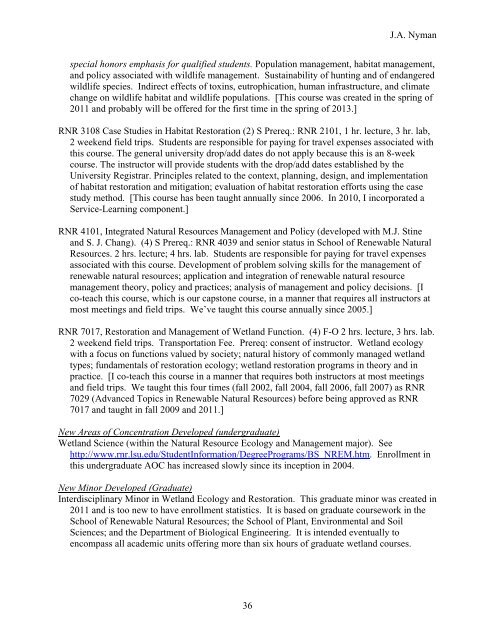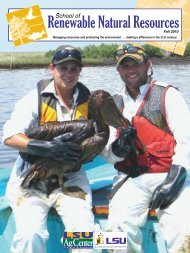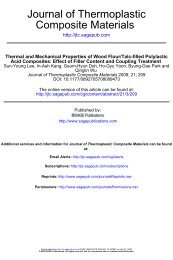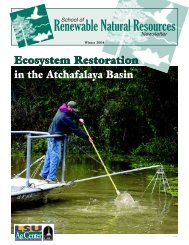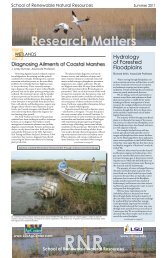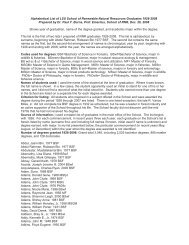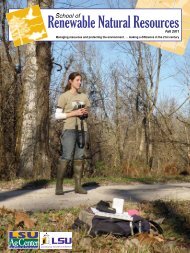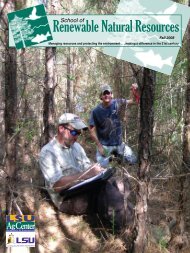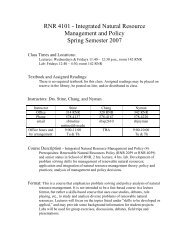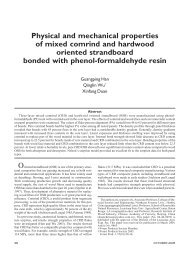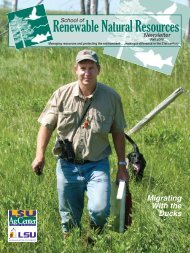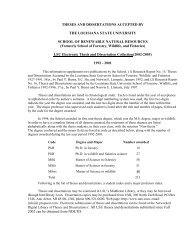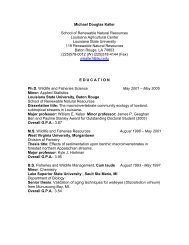john andrew nyman - LSU School of Renewable Natural Resources ...
john andrew nyman - LSU School of Renewable Natural Resources ...
john andrew nyman - LSU School of Renewable Natural Resources ...
You also want an ePaper? Increase the reach of your titles
YUMPU automatically turns print PDFs into web optimized ePapers that Google loves.
J.A. Nyman<br />
special honors emphasis for qualified students. Population management, habitat management,<br />
and policy associated with wildlife management. Sustainability <strong>of</strong> hunting and <strong>of</strong> endangered<br />
wildlife species. Indirect effects <strong>of</strong> toxins, eutrophication, human infrastructure, and climate<br />
change on wildlife habitat and wildlife populations. [This course was created in the spring <strong>of</strong><br />
2011 and probably will be <strong>of</strong>fered for the first time in the spring <strong>of</strong> 2013.]<br />
RNR 3108 Case Studies in Habitat Restoration (2) S Prereq.: RNR 2101, 1 hr. lecture, 3 hr. lab,<br />
2 weekend field trips. Students are responsible for paying for travel expenses associated with<br />
this course. The general university drop/add dates do not apply because this is an 8-week<br />
course. The instructor will provide students with the drop/add dates established by the<br />
University Registrar. Principles related to the context, planning, design, and implementation<br />
<strong>of</strong> habitat restoration and mitigation; evaluation <strong>of</strong> habitat restoration efforts using the case<br />
study method. [This course has been taught annually since 2006. In 2010, I incorporated a<br />
Service-Learning component.]<br />
RNR 4101, Integrated <strong>Natural</strong> <strong>Resources</strong> Management and Policy (developed with M.J. Stine<br />
and S. J. Chang). (4) S Prereq.: RNR 4039 and senior status in <strong>School</strong> <strong>of</strong> <strong>Renewable</strong> <strong>Natural</strong><br />
<strong>Resources</strong>. 2 hrs. lecture; 4 hrs. lab. Students are responsible for paying for travel expenses<br />
associated with this course. Development <strong>of</strong> problem solving skills for the management <strong>of</strong><br />
renewable natural resources; application and integration <strong>of</strong> renewable natural resource<br />
management theory, policy and practices; analysis <strong>of</strong> management and policy decisions. [I<br />
co-teach this course, which is our capstone course, in a manner that requires all instructors at<br />
most meetings and field trips. We’ve taught this course annually since 2005.]<br />
RNR 7017, Restoration and Management <strong>of</strong> Wetland Function. (4) F-O 2 hrs. lecture, 3 hrs. lab.<br />
2 weekend field trips. Transportation Fee. Prereq: consent <strong>of</strong> instructor. Wetland ecology<br />
with a focus on functions valued by society; natural history <strong>of</strong> commonly managed wetland<br />
types; fundamentals <strong>of</strong> restoration ecology; wetland restoration programs in theory and in<br />
practice. [I co-teach this course in a manner that requires both instructors at most meetings<br />
and field trips. We taught this four times (fall 2002, fall 2004, fall 2006, fall 2007) as RNR<br />
7029 (Advanced Topics in <strong>Renewable</strong> <strong>Natural</strong> <strong>Resources</strong>) before being approved as RNR<br />
7017 and taught in fall 2009 and 2011.]<br />
New Areas <strong>of</strong> Concentration Developed (undergraduate)<br />
Wetland Science (within the <strong>Natural</strong> Resource Ecology and Management major). See<br />
http://www.rnr.lsu.edu/StudentInformation/DegreePrograms/BS_NREM.htm. Enrollment in<br />
this undergraduate AOC has increased slowly since its inception in 2004.<br />
New Minor Developed (Graduate)<br />
Interdisciplinary Minor in Wetland Ecology and Restoration. This graduate minor was created in<br />
2011 and is too new to have enrollment statistics. It is based on graduate coursework in the<br />
<strong>School</strong> <strong>of</strong> <strong>Renewable</strong> <strong>Natural</strong> <strong>Resources</strong>; the <strong>School</strong> <strong>of</strong> Plant, Environmental and Soil<br />
Sciences; and the Department <strong>of</strong> Biological Engineering. It is intended eventually to<br />
encompass all academic units <strong>of</strong>fering more than six hours <strong>of</strong> graduate wetland courses.<br />
36


